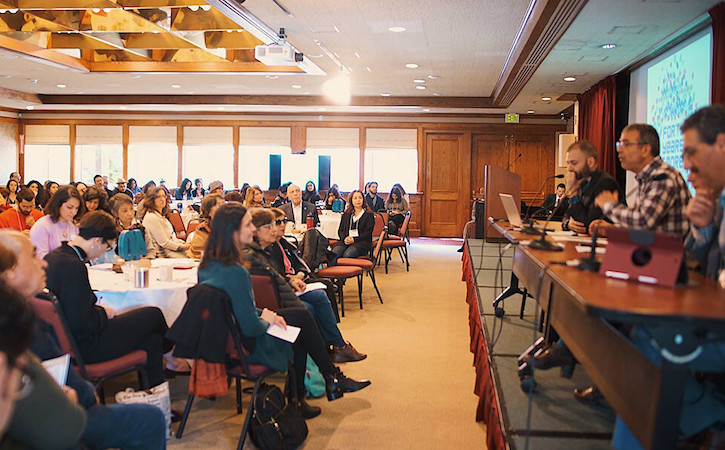'Forty Years and More': Landmark Conference at SF State Explores Iranian Diaspora

More than 200 scholars and artists from the U.S. and beyond gathered at San Francisco State during spring break to share new research and art about the Iranian diaspora from a variety of perspectives and national contexts.
Forty Years and More: International Conference on Iranian Diaspora Studies, hosted by the Center for Iranian Diaspora Studies from March 28 to March 30, marked the 40th anniversary of the Iranian revolution. Presentations and panel discussions investigated the ways that Iranians as exiles, immigrants and as second- and -third-generation “hyphenated” citizens of their respective nations have met with both challenges and opportunities.
The conference began with a reception at the San Francisco Arts Commission Gallery for Part and Parcel, an art exhibition examining geographies of belonging. Monica Chinchilla, aide to San Francisco Supervisor Asha Safai, read a proclamation from the City and County of San Francisco declaring March 2019 “Iranian Diaspora Month.”
The conference ended on an artistic note, with art, fashion and music at the Minnesota Street Project Art Gallery in San Francisco where Once at Present, featuring 19 Iranian diaspora artists from the Bay Area, is on display through April 20.
Identity was a significant theme throughout the conference: “who we are, who we’ve become and where we are going,” said Professor Persis Karim, director of the Center for Iranian Diaspora Studies.
The conference came at a critical time, she added: “Immigrants and children of immigrants have been vilified and made to feel like other.”
Conference attendees generated a social media buzz with hundreds of tweets using five different hashtags. Amy Malek, assistant professor of international studies at College of Charleston, marveled at Neda Maghbouleh’s “absolutely brilliant” keynote speech, which charted her own journey from her often-alienated childhood in Oregon as the child of Iranian immigrants. Maghbouleh eventually found her way to sociology and to the process of naming how that alienation came about, through her acclaimed book, The Limits of Whiteness: Iranian Americans and the Everyday Politics of Race (Stanford University Press, 2018).
“It’s a rare talk that can bring scholarly revelations, much-needed critique and tears of personal recognition,” Malek tweeted. “She has given us a gift today. So much respect.”
In remarks welcoming attendees, San Francisco State President Leslie E. Wong emphasized the importance of academic researchers sharing their findings with the public at large.
“You represent something of value that I think the world has to reacquaint itself with,” he said.
The Center for Iranian Diaspora Studies, led by Professor Persis Karim, launched in 2017 with a $5-million gift from SF State graduate Neda Nobari. It is the first and only center of its kind at an academic institution. Drawing upon San Francisco State’s robust academic foundation of ethnic, racial and social justice, the center inspires interdisciplinary inquiry and exploration of Iranian diaspora experience and its impact on transnational identity.
— Matt Itelson
Links
- Forty Years and More: International Conference on Iranian Diaspora Studies
- News article: Professor Karim Explores Iranian-American History, Immigration for NEH-Funded Digital Archive, February 8, 2019
- News article: ‘We Are Here, We Have Always Been Here’: SF State Produces First-Ever Documentary on Bay Area Iranian Community, November 27, 2018
- Center for Iranian Diaspora Studies